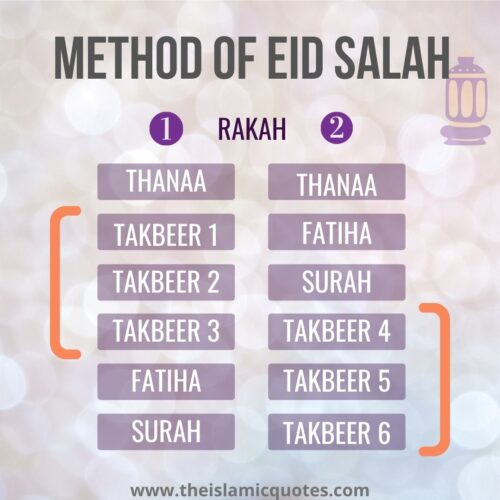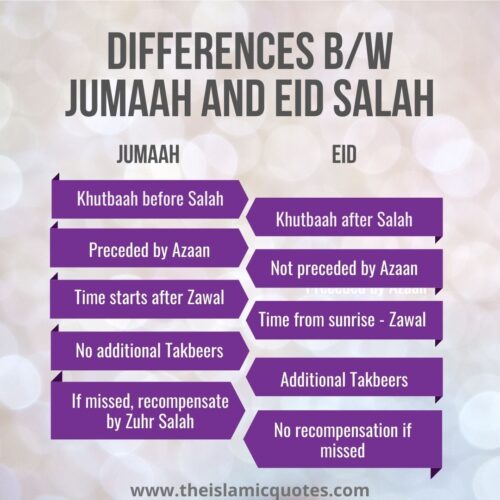Eid Prayer: what comes to mind as you think about it? Celebration, joy, happiness, new clothes, get-togethers, and all the yummy stuff, right? While that’s the spirit of Eid, we must not forget the guidelines Shariah has laid out for us.
Like everything in life, celebrations and festivities are also something Islam has provided us guidance in.
How to Perform The Eid Salat?
A companion narrates that when the Prophet ﷺ came to Madinah, he saw the people there celebrating some festivals. He asked his Sahaba about them, upon which they replied that in their pre-Islamic times, they celebrated with the people of Madinah these two festivals: Nawroz and Mahrjaan.

Thereupon, the Prophet ﷺ said that Allah SWT has now granted Muslims two festivals of their own. And hence, the festivities of Eid came about, along with their God-sent guidelines.

The core feature of these Islamic festivities, which distinguishes them from festivals of other religions and nations, is that even in celebrations, Islam commands us not to forget Allah SWT.
What is happiness that is attained out of disobeying the One who is the source of all joy? Truly, none.
Hence, to revive and rejuvenate the essence of obedience even amidst the celebration, Shariah has guided us to start our Eid with Salah – a deed beloved to Allah SWT.
But there’s so much more to know about Eid Salah.
Hence, if you’re looking for all the essential and authentic information regarding Eid Salah in one place, then you’ve landed the correct page. So, let’s get moving.
10. The Essence of Eid Prayer
Why are we required to offer the Eid Salah on Eid?
While only Allah SWT knows the true wisdom behind it, it appears that the concept of Eid Salah is to display gratitude to Allah SWT.
In Eid-ul-Fitr, we are grateful to Allah SWT to bless us with the month of Ramadan and grant us the ability to do ibadat in this blessed month. And, what better way to show that thankfulness than Salah?
Whenever we feel grateful to any loved one, we prefer to express that gratitude by doing something they like, right? And Salah is one of the most beloved deeds to Allah SWT. So, as an expression of gratitude, we offer Salah to Allah SWT in our days of celebration.
Another wisdom behind Eid Salah is to start the day with the obedience of Allah SWT. As mentioned before, Islam guides us to not engage in disobedience at times of celebration. Thus, we come together to offer the Eid Salaah on the day of the festival, being dutiful and obedient to the Most High.

9. What Does the Word ‘Eid’ Mean?
The word Eid derives from the Arabic word ‘owd,’ which means to return or come back.
Hence, Eid is called Eid because it comes back every year, bringing happiness, joy, laughter, and togetherness into our lives each year.
Can we even imagine a year without Eid? How boring and monotonous! Thankfully, Eid never fails not to return to bring smiles to our faces.

The Rulings of Eid Salah
8. Is Eid Salah Fardh, Wajib or Sunnat?
According to Imam Abu Hanifa (RH), Eid Salah is Wajib, which means it is compulsory, almost Fardh.
According to the other three jurists; Imam Shafi, Imam Ahmed bin Hanbal and Imam Malik (RH), Eid Salah is Sunnah Moukida which means that one cannot miss it without a valid Sharai excuse.
7. Upon whom is Eid Salah Wajib?
Eid Salah is wajib upon every individual on whom the Jumaah Salah is wajib, which means all Muslims except the slaves, the sick, women, and children essentially.
The Prophet ﷺ said
“The Friday prayer in congregation is a necessary duty for every Muslim, with four exceptions: a slave, a woman, a boy, or an invalid.”
(Mishkaat, 1377)
From here, we learn that it is not wajib upon women to offer Eid Salah. However, if they would like to join the Eid congregation in a place with complete accommodations for veil and segregation, they may do so.
If you want to encourage your kids to pray with you, I highly recommend that you go through our previous post on Ideas On How To Make Kids Excited For Eid.

6. Can Eid Prayer Be Offered at Home?
Eid Salah cannot be offered at home, be it a woman who intends to do so or a man.
Essentially, Eid Salah is not one of those prayers that you can offer alone. A congregation is a necessity for Eid Salah to take place. Were it possible to be offered alone, our beloved Prophet ﷺ would have done it for us to show the permissibility. But, throughout his life, he always offered Eid Salah with a congregation (Jama’ah).
For this very reason, Jurists state that if a person misses their Eid prayer, he cannot pray it alone or do Qadha. There is no Qadha of Eid Prayer.
The only possible situation is if a handful of people accidentally (not by purpose) missed the congregational Eid Salah. In this case, they can do a congregation of their own and offer Eid Salah. They should then be careful to follow all its conditions (khutba, etc.).
5. Where Is Eid Prayer Offered?
It is preferable to offer Eid Salah in Eid-Gash (a ground or place dedicated for Eid Salah) as this is what the Prophet ﷺ did.
However, one can offer it in a masjid if praying in an Eid-Gash isn’t a possibility.
4. What Is the Time for Eid Prayer?
The time for Eid Salah commences from the sunrise of the Eid day up until Zawal time (mid-day).
Eid Salah can be offered at any time during this period. However, Muslims across the world usually offer it soon after sunrise.
For Eid-ul-Fitr, it is recommended to delay the prayer a bit so that people can give their Sadqatul Fitr before the prayer and eat something.
However, the recommended time for Eid-ul-Adha Eid Salah is earlier so that people can engage in Qurbani as soon as possible.
Once, during the Prophet ﷺ ‘s time, the companions did not sight the moon of Shawwal (Eid) on the night of 30th Ramadan. They believed the next day to be a fasting day and hence kept the fast.
The next day, afternoon, a couple of people came and told the Prophet ﷺ that they had sighted the moon the night before. The Prophet ﷺ accepted their claim and instructed the people to break their fasts there and then because it was indeed the day of Eid!
He then offered the Eid Salah in the congregation the next day, which means the second day of Eid.
From this, we learn that if for some valid reason, Eid Salah is unable to take place on the first day of Eid, it can be offered on the second day of Eid. But remember; a valid reason is a must.
We also understand that if it were still possible to offer Eid Salah afternoon, the Prophet ﷺ would have indeed done so. Thus, the time of Eid Salah is only till Zawal.
Moreover, we also learn here that fasting is prohibited on Eid as it is a day of celebration, nice clothes, food, and enjoyment.

3. How to Pray the Eid Salah?
The defining characteristic of Eid Salah is the additional Takbeers (saying Allahu Akbar).
How many additional Takbeers are there?
Well, there is a difference of opinion among the Jurists with regards to this.
According to Imam Abu Hanifa (RH), there are six additional Takbeers. According to Imam Shafai (RH), there are 12 additional Takbeers, while according to Imam Maalik and Imam Ahmad bin Hanbal (RH), there are ten additional Takbeers.
For convenience, we will discuss the method of Eid Salah according to the Hanafi school of thought.
The method is as follows:
- First, make the intention in the way that ‘I am offering two wajib Rak’ats of Eid-ul-Fitr Salah with six wajib Takbeers, behind the Imam.’
- Then, commence your Salah with Allahu Akbar and recite the Thanaa. After that, raise your hands to your ears (as you usually do) and say Allahu Akbar. This is the first Takbeer. After saying it, drop your hands to the sides and pause for such a time in which you can say three Subhaan Allah‘s.
- Say the second and third Takbeer the same way. Except, do not drop your hands to your sides after the third Takbeer. Instead, tie them up on your chest as you usually would in Salah.
- The Imam would begin recitation now. Listen to him and complete the first Rak’at as you would typically do in your usual Salahs.
- In the second Rak’at, listen to the Imam as he recites the Surah Fatiha and another Surah.
- After that, say the three Takbeers the same way you said them before, that is, raise your hands until the ear, say Allahu Akbar, then drop your hands to your sides till the extend of three Subhaan Allah‘s. Except, do not tie your hands after the third Takbeer. Instead, drop them on the sides only.
- Next, say Allahu Akbar for Ruku’ as you usually would and go into Ruku’.
- Complete your Salah how you usually would.
After that, the Eid Salah, the Imam has to stand on the pulpit, and deliver two khutbas, where he sits between the two of them equal to the length he would sit between the two Jummah khutbas.

2. The Sunnahs of Eid Prayer
While we have covered most of the Fiqhi aspects of the Eid Salah, the Sunnahs of Eid are all about how you can adorn and beautify your Eid day.
The Sunnahs are the way the Prophet ﷺ did things. So, when we adopt those Sunnahs, we attract Allah SWT’s love and mercy towards ourselves.
So, what are the Sunnahs of Eid? Take a look

- Dress up and beautify oneself according to the Shariah
- Take a bath
- Use Miswaak
- Wear the best clothes you own
- Apply perfume
- Wake up early in the morning (let the birds greet you with Eid Mubarak!)
- Go early to the Eid-Gaah or Masjid

- Eat something sweet before going for the Eid Salaah
Anas (RA) said that “God’s Messenger ﷺ did not go out in the morning on the day of the breaking of the fast till he ate some dates, and he would eat an odd number.”
(Bukhari)
- Give Sadqatul Fitr before going for the prayer (help the poor rejoice and celebrate Eid too!)
- Offer the Eid Salah in the Eid-Gaah
- Take a different route while going and while returning from the Eid-Gaah or Masjid
Jabir (RA) said that on a festival day (Eid), the Prophet ﷺ would return by a different road from the one he had taken when going out.
(Bukhari)
- Go to the Eid-Gaah or Masjid on foot, if possible
- Recite the Takbeer softly as you walk towards the Eid-Gaah or Masjid

While many of these things we already normally do on Eid, such as dressing up and applying perfume, make the intention to act on Sunnah and earn multiplied rewards on simple acts!
1. How Is Eid Salah Similar to and Different From the Jumaah Salah?
Eid Salah and Jumaah Salah are two unique Salahs. However, they overlap in specific characteristics.
For one, the prerequisites and conditions of the Eid Salah are the same as that of Jumaah Salah; both of them can only be offered in a congregation and are compulsory on all Muslims except four (children, women, slaves, and the sick).
Jumaah Salah is Fardh, while Eid Salah is Wajib.
Both of these have two Khutbas. However, the Jumaah Khutbah is before the Salah, whereas in Eid Salah, the Khutbahs are after the prayer.
Apart from that, Jumaah Salah is preceded by an Azaan (the call to prayer), whereas the Eid Salah is not.
Also, the time of Jumaah Salah is the time of Zuhr Salah, that is after Zawal time (midday) has passed, whereas the time of Eid Salah is from sunrise till Zawal.
The main difference, however, is in the method of prayer. Jumaah Salah is our usual 2 Rak’ahs, whereas Eid Salah consists of additional Takbeers. Moreover, if you miss Jumaah Salaah, you have to make up for it by praying Zuhr. This is not the case with Eid Salah; once missed, it can not be recompensated. One can only seek Allah SWT’s forgiveness.

Conclusion
Now you are fully equipped with all the necessary information regarding Eid Salah. You might even be able to clear up the confusions of some other fellows yourself!
So, go ahead and enjoy a colorful and festive Eid, and make sure the obedience of the Most High beautifies it.
